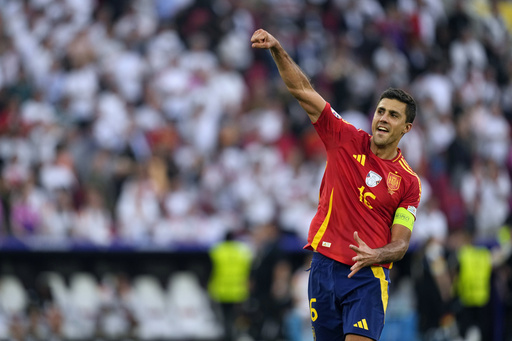MANCHESTER, England — One memorable moment in the world of soccer this year was when Rodri, the Spanish midfielder for Manchester City, made an appearance on crutches to accept the Ballon d’Or for the best male player. This came after he had passionately criticized the grueling soccer schedule, warning that the lack of sufficient rest is harming athletes’ health and performance. Just a month before attending the October 28 award ceremony, Rodri suffered a torn ACL during a routine Premier League match against Arsenal, marking the end of his season.
Although injuries are commonplace in soccer and not inherently caused by a busy schedule, Rodri’s injury has become symbolic of the physical strains associated with modern football, especially as legal challenges and potential player strikes are being considered in response to the compacted match calendar. Today’s top athletes often play over 60 games each season for both their clubs and their national teams, leading to an increase in injuries as the sport becomes more fast-paced and intense. Many players believe the new expanded Club World Cup, set to take place in the United States next year, is pushing them past their limits.
“The players are at breaking point; it’s simply too much,” remarked Alexander Bielefeld from FIFA’s players’ union, FIFPRO, emphasizing the sentiment of exhaustion among athletes today. The revamped Club World Cup will now feature 32 teams from around the globe competing every four years, beginning in June 2025. This significant expansion transforms the tournament into a club-level equivalent to the national team World Cup, adding further strain to players already coping with intense domestic league seasons.
Rodri voiced his concerns about the increasing demands on players right before his injury, stating that if the schedule continues to grow, athletes might have to refuse to play. Other high-profile soccer players share his frustration, including Raphael Varane, who highlighted the risks posed to players’ physical and mental health due to an unforgiving schedule. Jude Bellingham also characterized the current schedule as “crazy,” expressing how taxing it is for athletes both mentally and physically.
FIFPRO indicates that a considerable number of players routinely participate in 60 to 70 matches a year, even though the organization recommends a maximum of 55 games for player safety. Last season, Julian Alvarez played 75 matches across various competitions for both Manchester City and Argentina. In the previous year, Bruno Fernandes of Manchester United played 70 times, including a grueling streak of 20 consecutive matches.
Concerns about injuries are escalating, as noted by the Men’s European Football Injury Index, which recorded 4,123 injuries in the top leagues of England, Spain, Germany, Italy, and France last season. The report indicated a year-on-year increase in injuries since it began monitoring this data in 2021. Tony Strudwick, a medical professional for West Bromwich Albion, pointed out that despite advancements in sports science, injuries continue to rise, suggesting that the burden placed on players may exceed their physical capabilities.
Strudwick noted an alarming rise in hamstring injuries in recent seasons, adding that the pressure of an overloaded game calendar poses a significant risk of injuries and burnout. However, players are often reluctant to voice their exhaustion due to fears of repercussions, with Strudwick stating, “It takes a relatively brave person to say they cannot play.”
Last campaign, for instance, Manchester City participated in 61 matches after clinching titles in the Premier League, Champions League, and FA Cup, and this figure may jump to 71 in the current season due to expanded tournaments. While these concerns do extend into women’s soccer, FIFPRO highlights a disparity where some top female players experience heavy workloads, while others struggle to get playtime at all.
In response to its critics, FIFA noted that the new Club World Cup could potentially become a high-profile event comparable to the Premier League and Champions League, backed by major clubs and featuring global stars like Lionel Messi and Neymar. In an effort to mitigate player fatigue, FIFA insisted the tournament dates would be synchronized with the international match calendar to allow players adequate rest.
Yet, FIFPRO remains skeptical, having filed legal complaints against FIFA in Europe over the addition of larger competitions to the sporting calendar. In rebuttal, FIFA accused European clubs of hypocrisy in their scheduling, pointing out that many of them organize summer exhibition matches globally. Gelson Fernandes, a former player who now works with FIFA, argued that the issue of calendar congestion predominantly affects a small group of athletes and should not hinder opportunities for others to pursue their dreams on the global stage.


